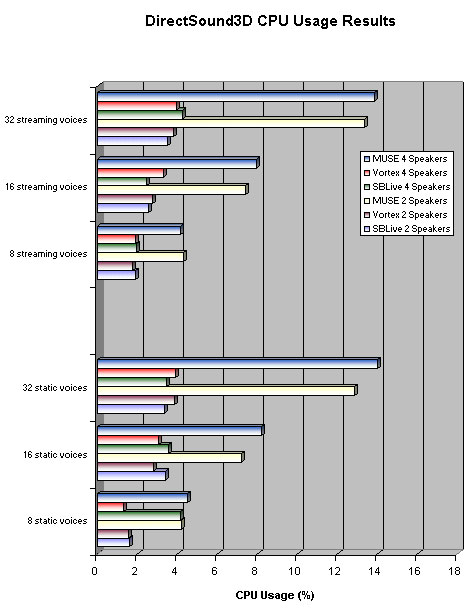Het volk van Neoseeker heeft een review over de Guillemot Maxi Sound Muse geschreven. Deze 4 speaker budget kaart van Guillemot heeft ondersteuning voor A3D 1.0, EAX 1 en DS3D. Men vindt de software die mee wordt geleverd evenals in deze review niet echt interessant. De kaart kreeg een score van 72%:
The MUSE is a great card and is priced very competitively against the Creative’s lower priced SB128 and SB64 cards. It even reaches upwards and above that into the realm of the SBLive Value area, and has little problems playing the various games we threw at it. I find it a shame that Guillemot chose not to take full advantage of the CMI8738’s capabilities. The CMI8738 chip has a very interesting feature: full support for a 24bit SPDIF inputs and a SPDIF output capable of 44.1K and 48K signal formats. At this price point, an SPDIF intput/output pair would have lured digital recording enthusiasts and would have pushed the MUSE straight past non-OEM competitor products such as the Diamond Sonic Impact S100 and the SBLive PCI-128.
With an MSRP of $29.99 and prices as low as $26, the MUSE is priced for a budget market. Compare it to a $40 Vortex2 Quad based sound card, or a $40 SBLive Value, and you can see that Guillemot is definitely aiming for a cost effective quad speaker solution. At this prices range, the MUSE does excellently. We had hoped the MUSE would be sort of a cut-in low-cost replacement for a Vortex 2, but its lack of A3D 2.0 support and its disturbingly high CPU usage take it out of that race. Instead, because of those factors, the card is more favorably compared against Creative’s PCI128 and AWE64 cards, priced around $29.99 – which is where Guillemot was targeting right from the start. I primarily split my sound card usage between multimedia audio and gamesplay, so something with high CPU usage won’t stay in my box for long. On the other hand, a family computer with a need for a solid multimedia card supporting current 3d gaming API’s will find this card fits the bill perfectly. All in all, a fine card, for what its aimed for, but not a card for someone who just bought themselves a shiny new RADEON or GeForce 2.
 |
